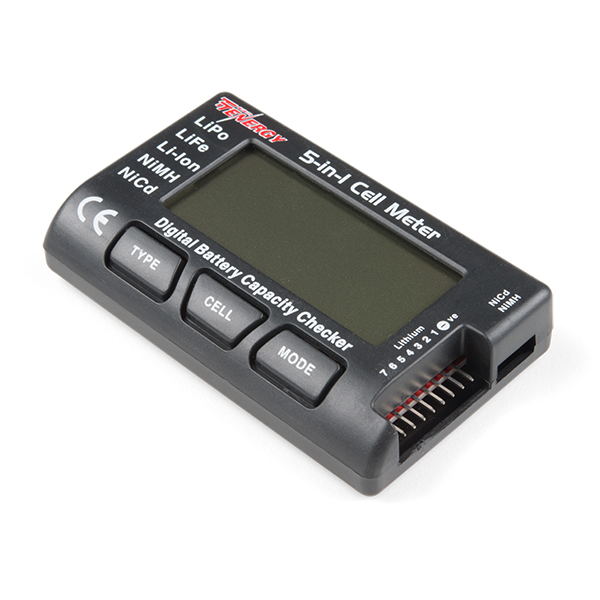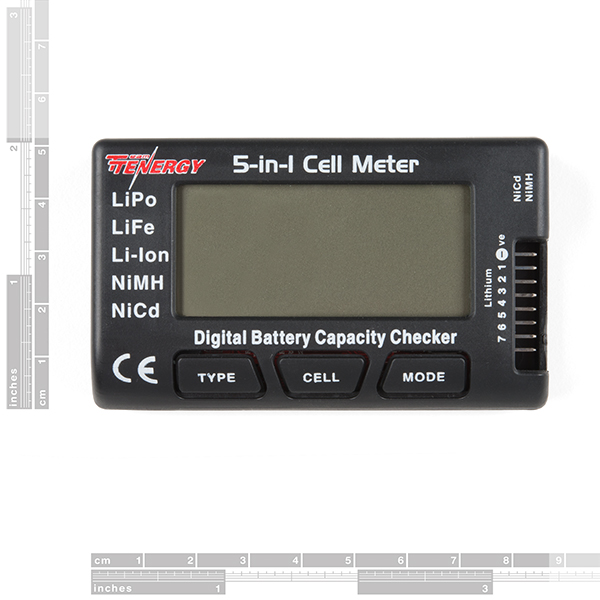Tenergy 5-in-1 Intelligent Battery Cell Meter
Do you yearn for complete and total mastery of your battery pack situation? Like a mystical amulet in a fantasy film, the Tenergy 5-in-1 Intelligent Cell Meter takes you one step closer to becoming an all-seeing and all-powerful battery wizard. In addition to allowing you to check the voltage of your batteries and view the capacity and internal resistance of each individual cell in lithium-based packs, this product functions as both a battery discharger and a battery balancer.
Evaluate the health of your battery pack and decide when to discard or replace it, discharge your pack to an adjustable threshold to improve its run time, and balance your batteries to optimize their performance and extend their lifespan. But wait--that's not all! This cell meter can even be used to test movement and adjust your servos via PPM signal!
Note: To avoid overheating, refrain from using the discharge function for more than six minutes at a time. Let the unit cool to room temperature before discharging again. Do not leave your battery discharging with this device unattended.
- Multipurpose battery meter
- Displays estimated voltages for LiPo/LiFePO4/Li-ion (2-7 cells) packs and individual cells
- Displays estimated voltages for NiCd/NiMH batteries for TX and RX (4-7 cells)
- Checks estimated capacities for Lithium-based packs and indicates if they require charging before use
- Battery discharger
- At discharge rate of 180mA, can discharge lithium-based battery packs to an adjustable threshold
- Battery balancer
- Ensures individual cells are balanced
- Internal resistance tester
- Displays the internal resistance of each individual cell in lithium-based battery packs
- ESC/servo PPM tester
- Supplies a reliable PPM signal to test and adjust your servo motors.
Tenergy 5-in-1 Intelligent Battery Cell Meter Product Help and Resources
Battery Technologies
February 6, 2013
The basics behind the batteries used in portable electronic devices: LiPo, NiMH, coin cells, and alkaline.
Core Skill: Electrical Prototyping
If it requires power, you need to know how much, what all the pins do, and how to hook it up. You may need to reference datasheets, schematics, and know the ins and outs of electronics.
Skill Level: Rookie - You may be required to know a bit more about the component, such as orientation, or how to hook it up, in addition to power requirements. You will need to understand polarized components.
See all skill levels
Comments
Looking for answers to technical questions?
We welcome your comments and suggestions below. However, if you are looking for solutions to technical questions please see our Technical Assistance page.
Customer Reviews
4 out of 5
Based on 1 ratings:
2 of 2 found this helpful:
Interface is a little opaque, but at least the manual is brief.
Checking batteries is easy, no need to RTFM, but for all the other functions you'll be doing button dances so you'll need to probably print out the manual. It's only two pages, so no big deal.
The "we can't add another button because it costs a tenth of a cent, so let's make the user jump through hoops" design is losing a star, other than that it's fine so far.
"Value engineering" is neither a value or engineering.


